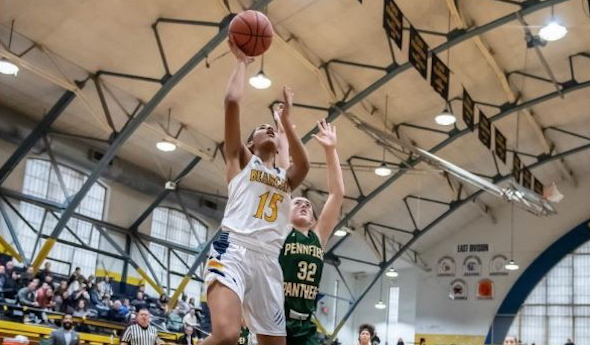
Hoops Finds Annual Home During Holidays
December 27, 2019
By Ron Pesch
Special for Second Half
Nothing says the Holidays like a high school basketball tournament.
It started, like many things do, with a drip. Well, make that a dribble.
The Michigan High School Athletic Association has allowed Holiday basketball tournaments for years. When was the first? That’s hard to establish. No one really kept track of such. A 1934 Wakefield News article indicates that a “Christmas Tournament will be held for the (Gogebic) Range teams at Wakefield December 27 and at Ironwood December 28.” Hurley, Bessemer, Ironwood and Wakefield were entered in the “blind” tournament, with opponents drawn just before game time. It was a new idea, at least in the Upper Peninsula.
“Nothing of its kind has ever been attempted in the Peninsula before,” stated the Ironwood Daily Globe. The tournament, won by Hurley, was a financial success. After expenditures, including the purchase of trophies, profit equaled enough that $22.42 was distributed to each school competing in the tournament. Plans were announced to bring back the tournament in a larger format the following year. It did return the following December, with the same teams in the same format but with all games played in Wakefield. This time out, Ironwood topped Hurley 22-21 for the tournament title.
In the Lower Peninsula in 1935, an All-Berrien County Holiday tournament was held Dec. 26, 27 and 28, with Three Oaks winning the Class B-C division title, 15-13 in the final over Berrien Springs. St. Joseph Catholic emerged as the Class D victor with a surprising 27-26 win over the reigning MHSAA state champ from Stevensville. The 14-team competition was played at Niles High School. Attendance was “slim, very slim” for the opening day of the tourney. The event did not return in 1936.
A similar, but much smaller, event was staged in Berrien County in 1941 with the Bridgman Class C Invitational. The tournament featured seven teams with contests spread over three nights. It was a success.
“Some 450 paid admissions were checked in Wednesday night for the championship finals, which Bridgman won from Berrien Springs. … The total paid admission for the three night event was 1,420 fans with a gross gate of approximately $400.”
By the mid-1940s, the idea of playing prep basketball during the Christmas lull had begun to take off across the state.
In December 1946, before a crowd of 1,500 at the Flint IMA Auditorium, Holland, the reigning Class A champion, downed Flint Northern 51-48 behind a pair of late field goals by Ken ‘Fuzz’ Bauman in the first annual Motor City Invitational. In Jackson, Detroit Catholic Central won the Michigan Catholic Invitational, beating Kalamazoo St. Augustine, 42-40. Bridgman again snagged the title at the Sixth Annual Berrien Class C Christmas Holiday Tournament. It was the Bees’ third Christmas championship in four years. The Little Eight Conference Holiday Tournament was played across four school gymnasiums as the calendar transitioned from 1946 to 1947. Bangor downed Covert, 34-29, in the championship contest hosted at Watervliet High School on Saturday, Jan. 4.
“Holiday tournament basketball has really caught on in Michigan,” said Hal Schram in the Detroit Free Press in 1947. “There will be no Christmas-New Year’s rest for at least 60 Michigan high school squads which have jumped at the chance to sharpen their collective shooting eyes for the long season ahead. … At last count, tournaments will be played between Dec 17 and Jan 3 at Flint, Saginaw, Grand Rapids, Jackson, Lincoln Park, Fremont, Negaunee, Marquette, Benton Harbor and Detroit.”
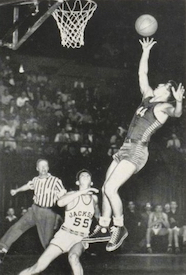 The same eight schools that played at the first Motor City tournament – Jackson, Grand Rapids Central, Holland, Muskegon Heights, Monroe, Midland, Flint Central and Flint Northern – were invited back for the second year. According to Schram, “Not a single participating school of a year ago wanted to be left out.”
The same eight schools that played at the first Motor City tournament – Jackson, Grand Rapids Central, Holland, Muskegon Heights, Monroe, Midland, Flint Central and Flint Northern – were invited back for the second year. According to Schram, “Not a single participating school of a year ago wanted to be left out.”
Jackson downed Flint Northern in the title game, 39-34.
The Saginaw Invitational, hosted at Arthur Hill High School, boasted six Class A schools as well as Alma and Mount Pleasant, both Class B schools. Mount Pleasant surprised the field, winning the tournament with a 40-25 triumph over Dearborn Fordson in the championship game.
A year later in December, Schram wrote, “The Michigan High School Athletic Association wasn’t caught unaware when the tournament bug started to bite every sector of the state.”
“Never did we expect such a wave of tournament play as we will see during the next three weeks,” said Charles Forsythe, state director for the MHSAA, noting 34 Christmas vacation tournaments were scheduled between December 15 and January 8 during the 1948-49 basketball season. “Perhaps we’re lucky at that. The Oklahoma association has had to sanction 123 tournaments.”
Forsythe and Schram explained the reasons for the wave of popularity. Of particular interest was the fact that, at the time, a school sponsoring both football and basketball could play a total of no more than 24 games, combined, in the two sports. However, MHSAA rules allowed a basketball team the chance to play as many as three games during a Holiday tournament and be charged with only one of its allotted combination of 24 contests. (The MHSAA rules changed prior to 1972-73 to allow basketball teams a maximum of 20 games.)
Coaches could keep their squads sharp during the two-week layoff with games rather than just mandatory practices. And, as a bonus to all because tournaments were financed through gate admissions, invitations to larger tournaments meant teams got to “stay and eat at the best hostelries, go on sightseeing tours when not playing and play non-conference opponents from other sections of the state.“
Add in the chance to play before larger-than-normal crowds, and the formula for a successful tournament was cast.
Beginning with the 1950-51 season, the football-basketball rule was altered to count play in mid-season invitational tournaments as two contests. With the change, according to the Detroit Times, “the number of such meets dropped sharply.”
Only nine Holiday tournaments, involving 50-plus teams, were recorded by the MHSAA during the 1951-52 season: the 5th annual Flint Parochial Invitational, the Alpena Catholic Invitational (involving 16 teams), the 5th Annual Greater Lansing Invitational, the Albion College Invitational, the Twin-Five Conference Christmas Tournament (a 10-team replacement for the disbanded Little Eight Conference’s tournament), the Otisville Invitational, the Columbiaville Invitational and the 1st Annual Portland St. Patrick Christmas Invitational.
But by the 1960s, Holiday Tournaments were again regaining popularity, with more now focused on teams from a specific community or section of the state, especially among smaller schools.
The St. Patrick tournament was still going strong in 1966 – its 15th year – with an eight-team, four-day design. Williamston downed a Cinderella squad from Carson City, 64-44, before 1,100 fans at Portland to earn the championship. Other Mid-Michigan holiday tournaments played out in Chelsea and Swartz Creek at the same time.
The Flint Parochial League Tournament was a mainstay of the Holiday season until the breakup of the league in the early 1970s.
“Basketball tournaments have become popular around the state and nation in recent years,” wrote Wendy Foltz, longtime Battle Creek Enquirer sports editor, before the kickoff of the inaugural Battle Creek Central Holiday Cage Tournament in 1968. In a twist that harkened back to earlier days, the eight-team event represented nearly every section of lower Michigan. “Battle Creek never has been a rabid basketball town like some around the state,” added a hesitant Foltz, noting a hope that the event could at least break even.
Hosted at the Cereal City’s historic Fieldhouse, built in 1928, that first tournament was won by host Battle Creek Central, which downed Traverse City 71-53 before a crowd of 2,000. Phil Todd led the Bearcats with 29 points, including 21 in the first half, while 6-foot-8 Tom Kozelko paced TC with 24. Muskegon Heights won the consolation game, holding off a late Ypsilanti Willow Run rally, 78-77. Other schools competing were Battle Creek Lakeview, Grand Blanc, Romulus and recently-opened Jackson Lumen Christi.
Chuck Turner, Central’s head coach, and junior varsity coach Jack Schils had contacted 60 schools during the summer of 1967 to organize the 12-game schedule.
“The response was terrific,” said Schils, who added, “Many schools could not accept because of schedule commitments but want to enter a year hence.”
The Battle Creek tournament was back in 1969, again hosting teams from near and far. Schils noted that cost ran high when teams were brought in from long distances: “However, this type of tournament is highly desirable so we hope fans will support it.”
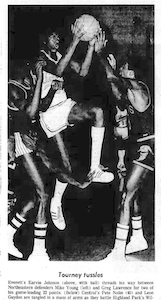
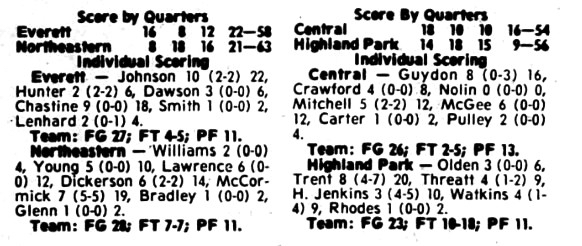 But the event was discontinued following the 1970-71 season when the “eight team format became too unwieldy,” according to the Enquirer “… and both crowd and the quality of play declined.”
But the event was discontinued following the 1970-71 season when the “eight team format became too unwieldy,” according to the Enquirer “… and both crowd and the quality of play declined.”
Pared down to a four-team format, it returned in a big way in December 1975. The tournament saw standing-room-only crowds of more than 3,000 for games between Battle Creek Central, Detroit Northeastern, Class A quarterfinalist Lansing Everett and reigning Class A champion Highland Park.
Detroit Northeastern downed Lansing Everett, 63-58 for the Cereal City championship trophy. Everett junior Earvin Johnson scored 22 points and, with teammate Reggie Chastine, was named to the all-tournament team along with Northwestern’s Wilbert McCormick, the tourney MVP, and his teammate Greg Lawrence. Highland Park’s William Trent and Battle Creek Central’s Leon Guydon also were named to the team.
By the 1980s, it seemed that the Christmas break nearly mimicked March in Michigan.
“I think a Christmas tournament really helps your program,” said Turner in 1980 to the Enquirer. He had taken over the head coaching position at Battle Creek in the fall of 1967 after a successful stint at Willow Run. “I don’t understand basketball teams having a preseason, playing three or four games, then taking two weeks off. When you get back, it’s like starting over.”
Besides Turner’s squad, the 1980 field included Detroit Western, Detroit Murray Wright and eventual winner Kalamazoo Central. The event would ultimately be re-christened the Battle Creek Central Chuck Turner Holiday Classic.
“The late Chuck Turner started bringing big games to the city over the holidays when he first started at the school in the 1960s,” wrote Bill Broderick in the Enquirer in 2018.
“Chuck started this because he wanted to give people the chance to come back home for the holidays and see everyone play. It’s been like a family reunion over the years,” Fred Jones told Broderick. Jones was a longtime assistant to Turner. “That we can keep it going in his name is great and hopefully we can keep if going for another 50 years.”
The girls are now part of the action. All five Battle Creek city schools – Central, Pennfield, Harper Creek, Lakeview, and St. Philip – were part of the event in 2018.
This year the Chuck Turner Central Field House Holiday Classic will again span two days – December 27 and 28 – and will again see all five city schools play on the historic floor.
Other Holiday tournaments scheduled this year include:
Petoskey Invitational – December 13-14
Raider Shootout – December 21
18th Annual Muskegon Area Sports Hall of Fame Classic – December 27
Earl McKee Classic – December 27-28
North Farmington Holiday Extravaganza – December 27
Motor City Roundball Classic – December 27
Cornerstone Invitational – December 27
Washtenaw Hoops Showcase – December 28
 Ron Pesch has taken an active role in researching the history of MHSAA events since 1985 and began writing for MHSAA Finals programs in 1986, adding additional features and "flashbacks" in 1992. He inherited the title of MHSAA historian from the late Dick Kishpaugh following the 1993-94 school year, and resides in Muskegon. Contact him at [email protected] with ideas for historical articles.
Ron Pesch has taken an active role in researching the history of MHSAA events since 1985 and began writing for MHSAA Finals programs in 1986, adding additional features and "flashbacks" in 1992. He inherited the title of MHSAA historian from the late Dick Kishpaugh following the 1993-94 school year, and resides in Muskegon. Contact him at [email protected] with ideas for historical articles.
PHOTOS: (Top) The Battle Creek Central and Pennfield girls face off during the 50th Chuck Turner Classic. (Middle) Shaheen Shaheen scores two points for Flint Northern, which fell to Jackson 39-34 during the 1947 Motor City championship game. (Below left) Lansing Everett’s Earvin Johnson makes a move toward the basket against Detroit Northeastern during the 1975 Battle Creek event. (Below right) Box scores from the 1975 tournament include Johnson’s 22 points in the 63-58 loss. Photos courtesy of the Battle Creek Enquirer, Lansing State Journal and Ron Pesch archives.)
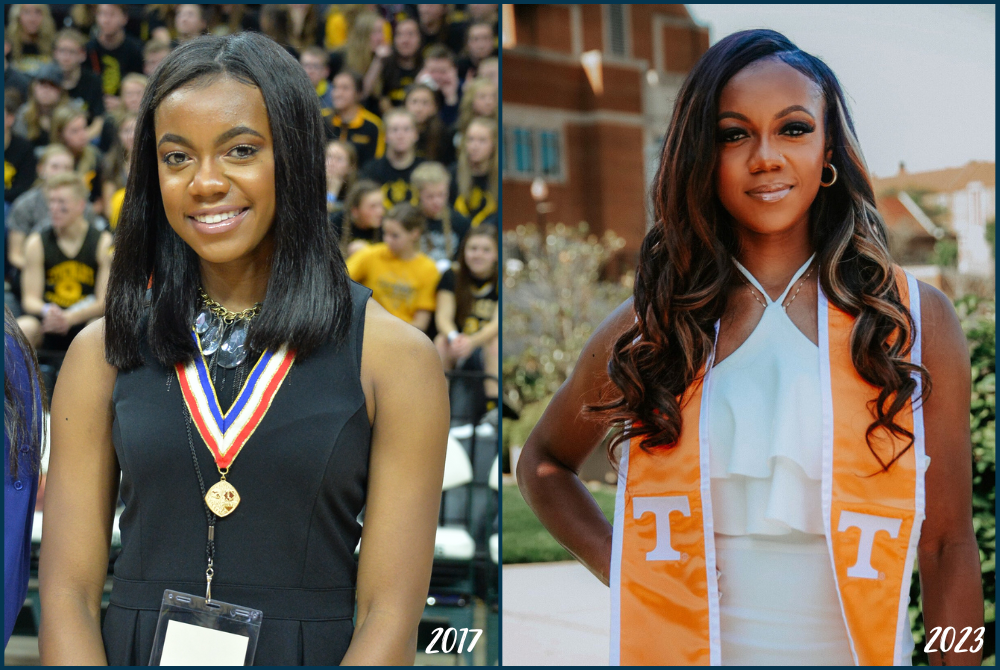
Shores Star Walker Continues Drive for Hoops Greatness as College Coach
By
Scott DeCamp
Special for MHSAA.com
August 8, 2024
NORTON SHORES — Dribbling, passing, and shooting are prerequisites for basketball players, and Muskegon Mona Shores alumna Jordan Walker did them quite well.
 But for Walker, determination has been perhaps her most important trait.
But for Walker, determination has been perhaps her most important trait.
It helped her win the Michigan Miss Basketball Award during her senior season in 2017 after suffering an ACL injury prior to her junior year with the Sailors. It’s also allowed her to continue an ascent in the basketball world.
Time-management habits and prioritization have been instilled in all three of Jarvis and Danielle Walker’s three children.
“There’s a special drive with these (Walker) kids,” said Brad Kurth, who was Jasmyn and Jordan Walker’s basketball coach at Mona Shores.
Jordan Walker earned two master’s degrees over six years of college while juggling the demands of being a Division I basketball player at Western Michigan University and University of Tennessee. The 25-year-old’s playing days appear to be finished, but she’s still pursuing her basketball dreams as an assistant coach at the D-I level.
Walker spent the 2023-24 season as a first-year assistant at Mercer University. This March, Mercer head coach Susie Gardner announced her resignation, meaning Walker had to seek opportunities elsewhere.
In typical Walker fashion, she landed on her feet, and it didn’t take long. In May, she was hired as an assistant coach at Jacksonville University. Her responsibilities include player development with point guards, academics, community service, and housing.
“(The Mercer position) kind of fit exactly where I was at perfectly,” Walker said during a break while on the road recruiting for Jacksonville recently. “I was really thankful for that opportunity and thankful for my circle and my village thinking of me at that time and putting my name out there because it honestly was the perfect situation for me.
“At the Final Four, you meet people and you meet a lot of coaches and you network, you build relationships. There was one coach I saw on the road a ton throughout the year and I saw at the Final Four and he knew the situation. At that point, (Jacksonville) didn’t have any openings, and later on it opened up and they gave me a call. At that point, it was getting to the interview and what the position holds and what it would look like. Again, it was another situation that was perfect for where I was at in life and what I wanted to do and the path that I’m on, so it was another no-brainer for me to head to Jacksonville.”
At Mona Shores, the 5-foot-7 guard broke the school’s all-time scoring record — one that stood 22 years — with 1,365 points. During her Miss Basketball season, Walker averaged 22.1 points, 8.5 rebounds, and 5.5 assists per game.
At the collegiate level, Walker amassed more than 1,300 points, 700 rebounds, and 400 assists. In two seasons with WMU (she lost one season with another ACL injury), she started 54 of 64 games and averaged 11.8 points, 4.9 rebounds, 2.2 assists, and 1.8 steals. As a graduate transfer at Tennessee, she started 77 of 96 games and averaged 6.3 points, 4.1 rebounds, 3.0 assists, and 1.1 steals while helping the Lady Vols reach the NCAA Tournament three times.
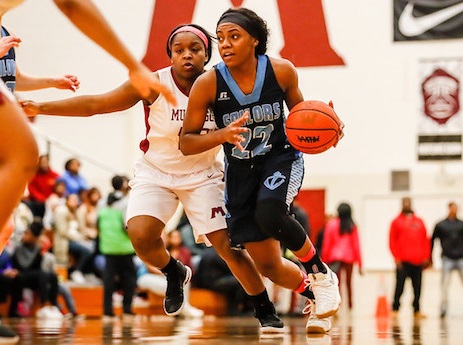 According to Walker, the foundation for her success began in the home and in the Mona Shores school community.
According to Walker, the foundation for her success began in the home and in the Mona Shores school community.
“Honestly, my memories with Mona Shores I truly cherish because it’s such a special time, a special place. Playing high school ball, I tell people AAU and high school ball is some of the most fun times that you’ll have playing. Obviously, I enjoyed my college time as well — I did six years,” she quipped. “But I definitely enjoyed my time at Mona Shores. Just the people that were there because it was a truly special place.
“Again, I talk about the village a lot because it does take that and (the) Mona Shores community, they really just poured into me and supported (me) and that’s something that I was always grateful for. Especially my head coach there, Brad Kurth. He did an amazing job with us and preparing us, not only for the games in high school but for the next level as well as far as player development and scouts and going over stuff like that so when I got to college, it wasn’t my first time seeing a scout, it wasn’t my first time doing a film study. Those things I always take with me.”
Of course, with the Walker family, it’s always been books before basketball.
While at Mona Shores, Jordan Walker served on the MHSAA’s Student Advisory Council and earned one of the prestigious MHSAA/Farm Bureau Insurance Scholar-Athlete Awards as a senior; only 32 honorees are selected annually. Walker earned her bachelor’s degree in political science and minor in communications from WMU in 2020, taking only three years. At Tennessee, she completed her first master’s degree in 2022 in business administration (MBA) with a concentration in entrepreneurship and innovation; she finished her second master’s degree in 2023 in the Agricultural Leadership, Education and Communications (ALEC) Department with a concentration on name, image, and likeness (NIL) and women’s leadership.
When Walker suffered the ACL injury at WMU, which sidelined her for a year, it allowed her to get ahead in the classroom. She had 19- and 20-credit semesters that year. In her third and final year at WMU, she was taking 21 credits in a semester.
“Academics in our house was nothing to play around with,” Walker said. “If you didn’t have your academics right — in the summer, if you didn’t finish your workbooks, if you didn’t read your books, you were not playing basketball. Academics were a big thing, and I thank my parents for that because they instilled that at a young age.
“It came down to time management, which kind of goes back to what I was saying about the foundation of your high school and what you do in high school and the habits that you form because that’s ultimately going to carry you throughout college. Of course, you can tweak it and gain new things, but I think Mona Shores did a great job of setting me up academically so that when I got to college, some of the courses that I took, I was able to comprehend at that level and take multiple classes and high-credit semesters and be able to graduate early, which led to me being able to get my (two) master’s (degrees).”
All three of the Walker siblings continue to achieve at a high level on and off the court.
Jasmyn Walker, the eldest of the siblings, was a first-team all-stater at Mona Shores and a Division I basketball player at Valparaiso and Western Michigan. She is in her first season as an assistant coach at George Washington University after previous stops at Purdue-Fort Wayne, Butler, Ferris State and Davenport.
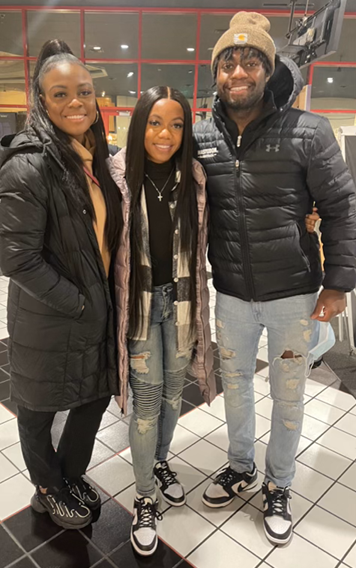 Jarvis Walker II, the youngest of the siblings, was a first-team all-stater at Muskegon High School and is a graduate student playing basketball for Indiana University-Indianapolis after starting his collegiate career at Purdue-Fort Wayne.
Jarvis Walker II, the youngest of the siblings, was a first-team all-stater at Muskegon High School and is a graduate student playing basketball for Indiana University-Indianapolis after starting his collegiate career at Purdue-Fort Wayne.
The Walker siblings are each other’s biggest fans.
“I’m immensely proud of them,” Jasmyn Walker said. “Jordy and Jay have gone above and beyond to reach their goals. I’ve seen the work they’ve put in, the time invested, and sometimes the lows that come with chasing dreams. They’ve pushed themselves at every turn.”
Jarvis Walker II said that sister Jordan is somebody who will “figure it out no matter the circumstances.”
He believes that each stop along her journey has afforded her great experience and deeper knowledge that will benefit her not only in basketball but in life.
“Grind, grind, grind — she is one of the hardest-working people I know,” he said about his sister. “It has motivated me to be better in every aspect of life from school to basketball and day-to-day interactions and how I go about certain things.”
In many respects, Kurth feels like a proud papa to the Walkers as he’s coached Jasmyn and Jordan and has spent countless hours around the family.
“All three of the kids — I mean, Jarvis, Jordan, and Jasmyn — I could never be prouder of a group of kids,” Kurth said. “You talk about the full package: Basketball is one part, but every single one of them shows academic excellence, every single one of them shows extreme character. Those are things that are timeless. Basketball is a young person’s sport. Coaching you can do a long time, but your playing days are limited. I think I’ve seen a lot of kids sacrifice everything, including their character, including their academics, to do basketball and they shouldn’t. Character should be at the top. These three kids, it’s just matchless.”
Included in Jordan Walker’s long resume is her active participation in leadership programs such as “So You Want To Be a Coach” and “Above the Rim Summit.”
Walker aspires to be a collegiate head coach. She’s doing all she can to keep climbing that ladder.
With her second master’s degree specializing in NIL and that being such a large part of college athletics now, she appears to have a leg up on her competition.
“NIL can look like a bunch of different things, and I think that when choosing a school and what that looks like, make sure that outside of NIL it meets all of your expectations,” Walker said. “Money and brand deals and all of that may look enticing, but still don’t fall on your standards of what your program you want to have has.
“It’s the academics, and if they have your major, and it’s the culture and it’s your relationships with your coaches and your teammates. Make those be your tops and NIL be a plus. I think that that’s the biggest thing.”
2024 Made In Michigan
August 6: MCC's Glover Fills Key Role as Athletic Trainer for Super Bowl Champions - Read
August 1: Lessons from Multi-Sport Experience Guide Person in Leading New Team - Read
July 30: After Successful 'Sequel,' Suttons Bay's Hursey Embarking on Next Chapter - Read
July 24: East Kentwood Run Part of Memorable Start on Knuble's Way to NHL, Olympics - Read
July 22: Monroe High Memories Remain Rich for Michigan's 1987 Mr. Baseball - Read
July 17: Record-Setting Viney Gained Lifelong Confidence at Marine City - Read
July 11: High School 'Hoop Squad' Close to Heart as Hughes Continues Coaching Climb - Read
July 10: Nightingale Embarking on 1st Season as College Football Head Coach - Read
June 28: E-TC's Witt Bulldozing Path from Small Town to Football's Biggest Stage - Read
PHOTOS (Top) At left, Jordan Walker stands with her class on the Breslin Center floor during the 2017 MHSAA/Farm Bureau Scholar-Athlete Awards ceremony, and at right in 2023 after receiving her second master's degree from University of Tennessee. (Middle) Walker makes her move toward the basket during a game her senior season at Muskegon Mona Shores. (Below) Jordan Walker, middle, takes a photo with sister Jasmyn and brother Jarvis. (Graduation and family photos courtesy of the Walker family; Mona Shores basketball photo by Tim Reilly.)

